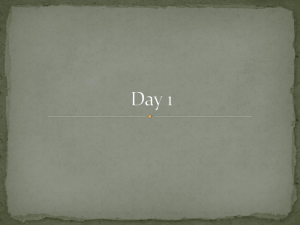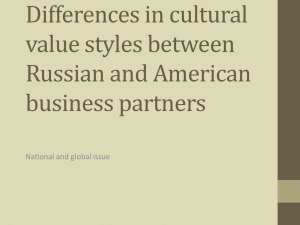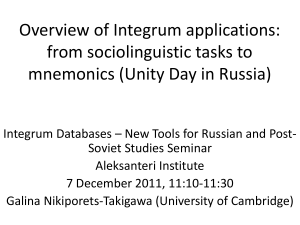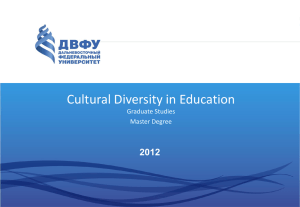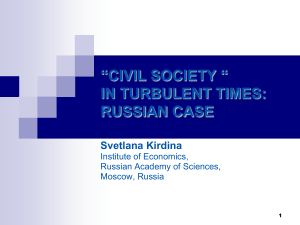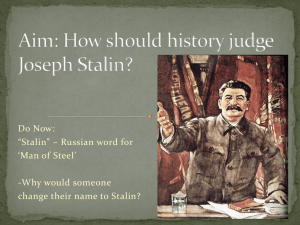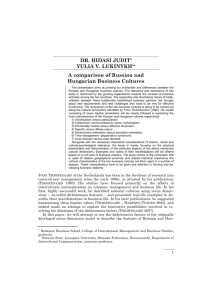One Country, Two Audiences: Television and the Internet in Russia
advertisement
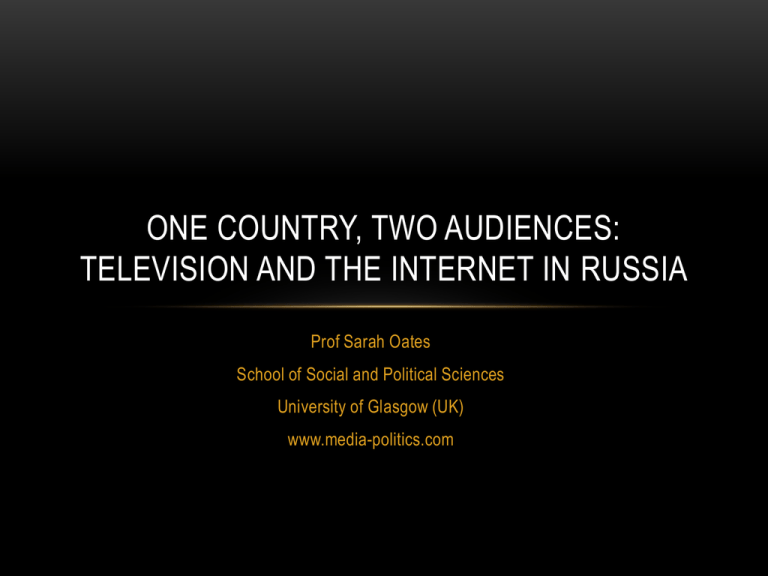
ONE COUNTRY, TWO AUDIENCES: TELEVISION AND THE INTERNET IN RUSSIA Prof Sarah Oates School of Social and Political Sciences University of Glasgow (UK) www.media-politics.com ANALYZING THE INTERNET IN RUSSIA • Center for New Media and Society at the New Economic School (РЭШ) http://www.newmediacenter.ru/ • Higher School of Economics, Moscow • Higher School of Economics, St Petersburg • Berkman Center for Internet and Society, Harvard University • University of Glasgow (UK) FIRST CHANNEL … GOING, GOING, GONE? 60 50 40 First Channel Mail.ru 30 20 10 0 Ages 12-54 Ages 12-34 Ages 12-17 ONLINE AUDIENCE IN RUSSIA: DATA • Detailed report on the Russian internet produced by the Russian government ИНТЕРНЕТ В РОССИИ: СОСТОЯНИЕ, ТЕНДЕНЦИИ И ПЕРСПЕКТИВЫ РАЗВИТИЯ, 2011 Федеральное агентство по печати и массовым коммуникациям http://www.fapmc.ru/magnoliaPublic/rospechat/activities/report s/2011/item6.html • 2010 survey of 2,017 Russian citizens 2010 SURVEY ON REGULAR MEDIA USE Percent 100 90 80 70 60 50 40 30 20 10 0 Percent National TV Local TV National Local Newspapers Newspapers Internet MEDIA TRANSFORMATIONS IN RUSSIA • Revolution or evolution? • Role of catalyst • How can we separate the different elements of the media in order to focus on it – without losing sight of the overall pattern? • News production, content and audience THE CHALLENGE OF STUDYING THE INTERNET • Pace of change • Relatively little empirical research • Very little comparative research across country boundaries • To what extent can the results of research grounded in a specific national context be generalised? • Internet – is it a cause or an effect? How do you formulate research questions and hypotheses? • Can you really separate the commercial from the political, and the private/personal from the public in the online world? TOP 10 MEDIA PREFERENCES FOR RUSSIANS AGED 12-54 Outlet Type Daily average Weekly average First Channel State-run TV 40.5 72.3 Rossiya 1 State TV 35.3 68.5 NTV Commercial TV 34.0 65.9 STS Commercial TV 33.2 64.8 TNT Commercial TV 29.9 59.4 Yandex Search engine 29.3 47.7 Mail.Ru Online mail portal 25.8 44.0 Ren Commercial TV 25.8 56.3 Vkontake.ru Social-networking site 24.0 35.7 Evropa Plus Commercial radio 22.1 48.1 TOP 10 MEDIA PREFERENCES FOR RUSSIANS AGED 12-34 Outlet Type Daily average Weekly average Yandex Search engine 35.4 56.5 Vkontake.ru Social-networking site 34.2 49.0 First Channel State-run TV 33.7 66.6 STS Commercial TV 32.5 63.6 TNT Commercial TV 31.2 60.1 Mail.Ru Online mail portal 30.3 52.0 Evropa Plus Commercial radio 28.3 56.9 Rossiya 1 State TV 27.4 61.5 NTV Commercial TV 26.6 59.5 Russkoe Radio State radio 23.2 50.2 TOP 10 MEDIA PREFERENCES FOR RUSSIANS AGED 12-17 Outlet Type Daily average Weekly average Vkontake.ru Social-networking site 44.3 58.3 STS Commercial TV 36.3 68.1 Yandex.ru Search engine 35.1 55.4 TNT Commercial TV 32.6 62.0 Evropa Plus Commercial radio 32.5 59.0 Mail.Ru Online mail portal 29.2 50.3 Russkoe Radio State radio 26.0 47.8 First Channel State-run TV 24.2 55.9 Love Radio Commercial radio 21.4 41.2 Humor FM Commercial radio 18.9 36.5 ONLINE AUDIENCE IN RUSSIA • Is there evidence for a link between heavy internet use and political values? • Is the internet audience changing qualitatively as it increases quantitatively? FINDINGS • Evidence that internet use is linked to more skepticism and less support for the Russian regime. • Emergence of an ‘internet generation’ in Russia: high levels of internet penetration among Russian youth + internet use is spreading fast and wide among Russians under the age of 40. • Attitudes appear to change with internet use – even when other socio-economic variables are weighed in the balance QUESTIONS • Can the rapid growth in internet signal a significant challenge to the current Russian regime? • Are there particular features of an online audience, including size, attitude, behavior, or pace of growth, that could predict its contribution to democratization? • From 2000 to 2010, the number of Russians on line grew by almost 2,000%, reaching 59.7 million users or 43% of the population by March 2011. http://www.internetworldstats.com/stats4.htm#europe WHAT FUELS GROWTH IN ONLINE AUDIENCE? • Rise in income for Russians in the past decade with falling cost of access • Spread of internet usage from urban elites to a much wider base • Government policy that has encouraged the use of ICTs • Lack of repressive state controls on Russian internet • Attractive range of Russian internet platforms and websites for users that play to a strong cultural interest in reflective discussion • Development of mobile internet augmented by the extremely widespread use of mobile telephones in Russia • Well-educated and attentive media audience. RECENT GROWTH IN ONLINE AUDIENCE • From winter 2009-10 to winter of 2010-11, growth in internet penetration in Russian villages (syela) exploded, increasing from 19% to 28% for a 48% growth rate over a single year. There was in growth in Russian internet use everywhere – from 22% in towns from 100,000 to 500,000 residents to more modest 4% in the relatively saturated Moscow internet market. ONLINE GENERATION GAP • While 84% of those aged 12-17 use the internet, only 8% of those over the age of 55 are on line. • Following current trends, the communications agency report predicts that virtually all Russians from the age of 12 to 45 will be on line by the autumn of 2014. The report • The report predicts internet usage saturation rates of 99% for 12 to 17-year-olds and 97% for those between 18 and 45. Meanwhile, while usage will reach 76% for those between age 45 and 54, the report predicts that the oldest segment of society will only reach 24% internet saturation by late 2014. THE RULE OF TV -- 2004 • 62% said they received news about politics every day from television (28% from radio and just 14% from newspapers) • 75% watched Channel 1’s Vremya nightly news regularly, 62% watched Vesti regularly, and 38% watched Sevodnya regularly. • The evidence would suggest that the media, particularly state television, have quite a strong influence: 40% of the respondents in the 2004 survey claimed that national state television was the most important source of information for their vote choice in the Duma elections. • Also, Russians often report they make their mind up during campaigns HOW DO RUSSIANS FIND NEWS ONLINE (RUSSIAN AGENCY REPORT) • 38% of traffic to online media sites comes as a user goes directly to a particular URL • Another 17.5% comes from search. Thus, while search is the most popular activity on the Russian internet, it is clear that people are only searching for news a fraction of the time. • Other traffic to online media sites comes through news aggregators (9%), other media websites (9%), web portals such as Mail.Ru (8%), traffic aggregation sites (6.5%); and banner ads (5%) Russian agency report THE INTERNET, NEWS AND THE RUSSIAN AUDIENCE • Major news websites serve more as tunnels into narrow selections of news from single producers rather than opportunities to garner more news from a range of sources. • If it appears that Russians are fairly narrow in their consumption of news, it can be argued that they are relatively broad in their discussion of the news in the online sphere. REGULAR INTERNET USERS IN RUSSIA • Think it’s easier to join organizations • Freedom of speech easier • Easier to participate in public life • Have greater respect for human rights • Trust commercial enterprises MORE, the government, parliament and state TV LESS • No effect on trust in commercial TV Source: 2010 survey (bivariate correlations) WHO SUPPORTS MEDVEDEV? • Those who watch Vremya • Women • NOT those who are online • Source: 2010 survey, regression analysis Russian television does not have a parallel dominance in the online sphere and the younger audience shows more interest in online rather than traditional media could signal a fundamental shift in the loyalty and attention of key segments of the Russian news audience. FIRST CHANNEL … GOING, GOING, GONE? 60 50 40 First Channel Mail.ru 30 20 10 0 Ages 12-54 Ages 12-34 Ages 12-17 FUNDING • The Internet and Everyday Rights in Russia, Economic and Social Research Council (UK), Grant RES000224159 • International Potential, National Limits: Investigating the Role of the Russian Internet in Constraining the Social Agenda, British Academy Research Grant • 2010 survey data from: Economic and Social Research Council Grant R000223133 Building a New Democracy?: Television, Citizens and Voting in Russia



